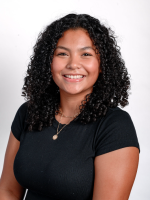In 2023, as a junior in high school, Miami native Iris Mogul started a banned books club. Now a college student at the University of California, Santa Cruz, she’s still advocating against book bans and censorship. Mogul was recently named Youth Honorary Chair for the American Library Association’s Banned Books Week.
WLRN’s Helen Acevedo spoke with Mogul about what first inspired her, what keeps her motivated, and how she’s continuing to stand up for free speech and access to literature in schools.
This interview has been edited for brevity and clarity.
WLRN: What inspired you to start a banned books club? Was there a specific moment in time that you thought, ‘I have to do this’?
MOGUL: I wanted a book club. I tried to find an in-person one and I had some trouble. So, I called Books and Books and asked them if I could organize a group of people and meet there once a month.
And then the banned books element…there was something going on with AP African American Studies and DeSantis was on his rampage, and you know, lists after lists of book bans. It felt relevant. And it just felt like a good way to meet like-minded people and have the conversations that they don't want us to have.
As someone on the front lines of this issue, what are you hearing from teachers, students, and the public today?
From teachers, a lot of fear because people are getting fired over having certain books in their libraries and teaching history. I got a lot of support from my peers, but not a lot of young people showed up to the club. I think there's like one other person around my age in the club right now.

READ MORE: Former Palmetto Senior High grad takes anti-censorship fight to national stage
Why do you think that there was only one other person around your age?
I don't think it has to do with the fact that it's a banned books club. I think, just the way the education system works, people don't get excited about reading because they're tested on books in English class in a really formulaic way and it makes reading feel like a drag.
What do you think teachers, parents and people in the realm of education can do to get students back into enjoying reading?
I think any way that teachers can [allow] room for conversation in classrooms. And I think giving your students a choice on what they want to read, like having some options and letting them vote or something like that. I think that little amount of choice in the process makes it more enjoyable.
When we're talking about banned books, social issues tend to come up. They're apparently the most frequent target of these restrictions. Why do you think that is?
I think it's calculated. I mean, it depends on what kind of banned book we're talking about. There are a lot of books that talk about systemic racism and critical race theory. I think the goal of banning [those books] is to stop people from realizing what really goes on in this country and the history of this country.
Are you seeing similar concerns around censorship or book bans on college campuses as well? How are you continuing to engage people in these conversations?
Book bans [are] always relevant and always harmful. But I think in a college setting, they have a little bit less direct impact on students than in a high school, elementary school, middle school setting. But I think censorship and censoring freedom of speech and protests has been at its peak on college campuses. That kind of censorship to me is almost the most chilling.
What do you think is missing from the broader conversations surrounding book bans and censorship in schools and other public institutions?
I think one, giving students a voice and confidence to be able to talk about this is really important.
But I think Book Banning can have a really concrete impact on people who don't have access to buy books, who need to get a book at a library or read it in school or don't have time besides to read for school. But I think it's a larger symbol. I think it means that the people in power are scared of our ideas and voices, and I mean that's just a testament to how powerful they are.
Have you seen any wins as a result of activism like yours?
I think creating community around this is really cool. It's kind of a side effect of being censored. Everyone who's angry about it gets together and does something. That's what the book club has been. That's what being Youth Honorary Chair allowed me to see. I think the most hopeful thing is the amount of people who give a sh—.







